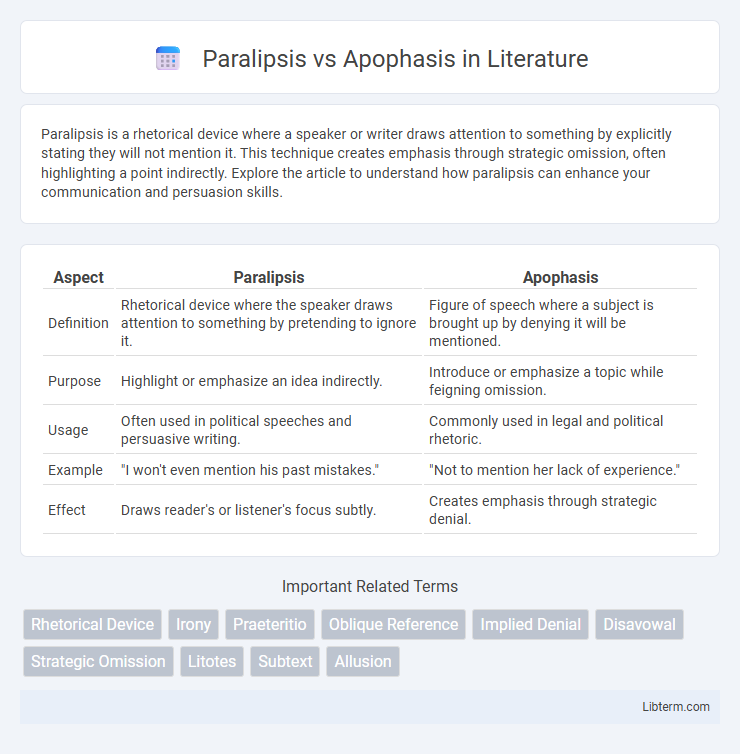Paralipsis is a rhetorical device where a speaker or writer draws attention to something by explicitly stating they will not mention it. This technique creates emphasis through strategic omission, often highlighting a point indirectly. Explore the article to understand how paralipsis can enhance your communication and persuasion skills.
Table of Comparison
| Aspect | Paralipsis | Apophasis |
|---|---|---|
| Definition | Rhetorical device where the speaker draws attention to something by pretending to ignore it. | Figure of speech where a subject is brought up by denying it will be mentioned. |
| Purpose | Highlight or emphasize an idea indirectly. | Introduce or emphasize a topic while feigning omission. |
| Usage | Often used in political speeches and persuasive writing. | Commonly used in legal and political rhetoric. |
| Example | "I won't even mention his past mistakes." | "Not to mention her lack of experience." |
| Effect | Draws reader's or listener's focus subtly. | Creates emphasis through strategic denial. |
Introduction to Paralipsis and Apophasis
Paralipsis and apophasis are rhetorical devices that emphasize a subject by stating that it will not be mentioned, thereby drawing attention indirectly. Paralipsis involves highlighting something by alleging that it will be passed over, often to cast subtle emphasis or irony. Apophasis functions similarly, used in political speeches and literary works to introduce topics while pretending to avoid discussing them directly.
Defining Paralipsis
Paralipsis is a rhetorical device where the speaker brings up a subject by explicitly stating they will not mention it, thereby drawing attention to it indirectly. This technique often serves to emphasize a point while feigning restraint or omission. In contrast to apophasis, which involves denial or negation to highlight an idea, paralipsis strategically uses omission as a form of emphasis.
Understanding Apophasis
Apophasis is a rhetorical device where the speaker brings up a subject by denying it or pretending to pass over it, effectively emphasizing the point through omission. It works by strategically highlighting information while appearing to withhold it, often used in persuasive speech to subtly introduce controversial topics without direct confrontation. Unlike paralipsis, which openly states it will not mention something, apophasis subtly manipulates attention, making it a powerful tool in rhetoric and political discourse.
Historical Origins and Usage
Paralipsis and apophasis both originate from classical rhetoric, with paralipsis tracing back to Greek oratory techniques where speakers emphasize a point by claiming to omit it, while apophasis, derived from the Greek word 'apophanai' meaning "to deny," involves mentioning something by stating it will not be mentioned. Historically, ancient Greeks like Aristotle and later Roman rhetoricians such as Cicero and Quintilian formalized these devices as persuasive strategies in speeches and texts. These figures utilized the techniques to indirectly introduce topics or criticisms, influencing rhetorical traditions in Western literature and political discourse.
Key Differences Between Paralipsis and Apophasis
Paralipsis and apophasis both involve mentioning something by stating it will not be mentioned, but paralipsis is a rhetorical device that explicitly claims to omit information while subtly revealing it, often for emphasis or irony. Apophasis is more narrowly focused on denying the discussion of a subject while introducing it indirectly, primarily to highlight or criticize without explicit statement. The key difference lies in paralipsis's strategic use of omission to draw attention, whereas apophasis uses denial of mention to indirectly make a point.
Common Contexts in Rhetoric
Paralipsis and apophasis are rhetorical devices frequently used to emphasize a point by ostensibly omitting it, often found in political speeches and persuasive writing. Paralipsis involves stating something by declaring that it will not be mentioned, while apophasis explicitly brings up a subject by denying intent to discuss it, commonly used to introduce criticism indirectly. Both techniques appear prominently in legal arguments and comedic monologues where subtlety and irony enhance the speaker's message.
Famous Examples in Literature
Paralipsis and apophasis are rhetorical devices often employed in literature to emphasize a point by claiming to omit it. Famous examples include Shakespeare's use of paralipsis in *Julius Caesar* when Mark Antony repeatedly insists he "comes to bury Caesar, not to praise him," subtly highlighting Caesar's virtues. Apophasis appears in Cicero's speeches, where he pretends to avoid mentioning scandals about his opponents while actually drawing attention to them, showcasing persuasive political rhetoric.
Political and Public Speaking Applications
Paralipsis and apophasis are rhetorical strategies frequently employed in political and public speaking to influence audience perception subtly. Paralipsis involves drawing attention to a subject by claiming to omit it, often used to highlight sensitive or controversial issues without direct engagement, thus shaping narrative control and managing public discourse. Apophasis functions by mentioning something by denying it will be mentioned, allowing speakers to introduce topics strategically while maintaining plausible deniability, making both techniques powerful tools for persuasion and agenda-setting in political communication.
Pitfalls and Misconceptions
Paralipsis and apophasis both involve emphasizing a point by pretending to omit it, often causing confusion between the two due to their similar rhetorical approach. A common pitfall is mistaking paralipsis for simply avoiding a topic, while it actually highlights the subject by feigning omission; apophasis, however, explicitly denies mentioning something to draw attention to it. Misconceptions arise when these devices are used imprecisely, leading to ambiguity in communication and undermining the speaker's intended emphasis.
Conclusion: Choosing the Right Device
Paralipsis emphasizes withholding information by pretending to omit it, creating emphasis through strategic silence, while apophasis explicitly states what is being denied or ignored, highlighting it indirectly. Choosing the right rhetorical device depends on the speaker's intent: paralipsis suits subtle suggestion or irony, whereas apophasis effectively draws attention by explicit negation. Understanding audience perception and context ensures the device enhances persuasive impact without causing confusion or unintended emphasis.
Paralipsis Infographic

 libterm.com
libterm.com